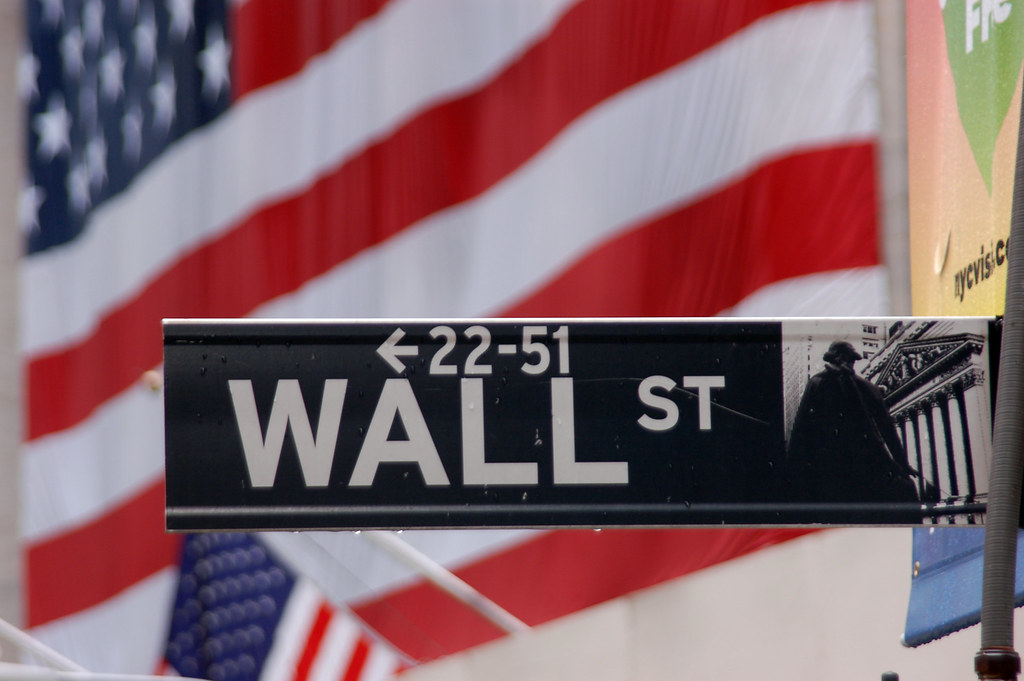Wall Street executives are digging in their heels against the prospect of divesting from fossil fuel investments. At a February event, they peddled the extremely dangerous and false theory that modern society can “rely on the power of markets” to decarbonize our climate-destroying economy.
What should be obvious by now is that if free-market capitalism was going to catalyze the “rapid and far-reaching” changes needed to avert the worst effects of climate change, it already would have. Only a strong, dedicated government acting with serious urgency can force the self-preservation needed for survival.
Apparently no one told the industry’s latest lobbying coalition, the “U.S. Climate Finance Working Group”, made up of industry actors including banks, insurers, and Wall Street stock trading firms. This working group is desperately trying to convince regulators that the private sector alone — and unregulated, thank you — can fix the climate crisis, and that somehow it can do so while continuing to drill for and burn fossil fuels. The group claims that “time and investment and innovation” will save us from ourselves, and that government regulation is inadequate and unnecessary.
This is so clearly false and, frankly, murderous. Private markets have had their chance: fossil fuel companies have known for over 60 years that their products were causing climate breakdown. For six decades, they could have been innovating the way out of this dire emergency. For six decades, they could have been taking the slow, incremental steps they pretend are now their big solution. But for six decades, they have loudly and decisively done the opposite. And Wall Street has financed the entire process.
Climate-devastating industries can only survive as long as they have financial investors, insurers, and a government which refuses to regulate for the common good. If those investors and insurers simply chose to end their involvement in planetary death, many of our most pressing problems would be relieved. But they have chosen time and again not to do so on their own, leaving government intervention the only option.
Indeed, on the industry’s own terms, aggressive government intervention is the only right and moral path to tackling climate change. For more than 40 years, Wall Street has worshipped at the feet of Milton Friedman’s theory that a firm’s only obligation is to its shareholders, and those shareholders’ only demand should be profits. Let governments worry about the social good, the business world’s job is just to make money. Well, if for thirty years Wall Street has refused to consider climate change a monetary risk and invest accordingly, it should then fall to the government to aggressively intervene. Does Friedman’s argument only apply when it’s convenient to Wall Street?
Even now, industry actors are pushing for “voluntary” climate disclosure requirements, as if letting profiteers report their own risks has ever been successful for anyone besides themselves. Federal Reserve Governor Lael Brainard, who last Thursday expressed support for an industry-led group to develop applicable disclosure standards (again, when has that ever been a good idea?) is waffling in the face of corporate pressure against mandatory disclosure, saying we should strive for “an appropriate balance” between government and private action — in other words, a balance between forcing action and having everyone cross their fingers and hope short-term greed somehow doesn’t win out this one time on Wall Street. Brainard and others will need strong and constant public pressure to do what’s right.
The federal government does indeed have the necessary power to force a shift in capital away from carbon-intensive industries (although fully utilizing that power depends on a government staffed with public-minded individuals, not corporate revolving door-types). Given that the federal government has given itself the responsibility to ensure financial stability, they could levy tax penalties or subsidies, mandate climate risk disclosures, and establish lending standards for individual industries accessing credit on Wall Street. Regulators could alter interest rates, charter banks depending on their divestment status, and designate financial giants like BlackRock as systemically important and therefore subject to more stringent regulation. They could also assert public ownership over fossil fuel companies to initiate their phase-out.
That last point dissolves one of BlackRock CEO Larry Fink’s final dying arguments against government-mandated divestment - that a full divestiture of hydrocarbons (which he incorrectly labeled “greenwashing” in almost comical irony, given BlackRock is King of greenwashing) would be useless because “[i]f a public company sells off a lot of their hydrocarbon business to a private entity, the world doesn’t change.” Well, Fink will be relieved to learn that the federal government can purchase and manage those pesky assets and quickly wind them down while transitioning workers in those industries to well-paying, green union jobs. (Of course, he should already know that, since his own firm has handled most of the Fed’s asset purchases since last year’s CARES Act!)
Wall Street executives are trembling at the sight of government regulation on the horizon because they fear losing profits and power. But their fear is irrelevant when measured against the terrifying reality of a world rocked by climate change, and the unnerving prospect of a scenario in which we do nothing about it because a handful of traders saw some short-term opportunities in juicing Big Oil.
At the end of the day, how Wall Street feels about government intervention does not matter. Ambitious government figures, Lael Brainard being only one, must understand that satisfying progressives (read: preserving a livable planet) means disappointing Wall Street titans like Larry Fink. We have free-marketed ourselves into a climate emergency, and only steadfast leadership of a government accountable to its people, and therefore willing to end all financing of this crisis, will get us out.
Photo: “Wall Street” by Sjoerd van Oosten is licensed under CC BY-NC-ND 2.0

